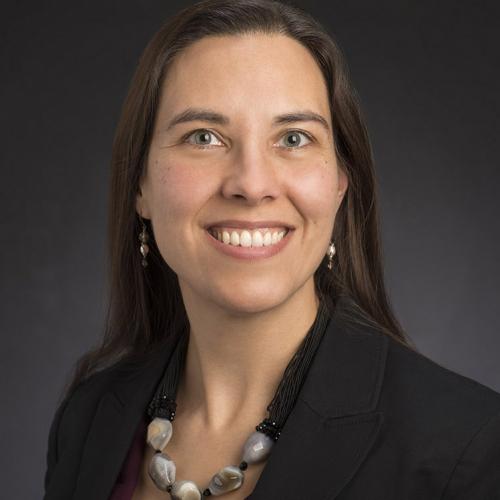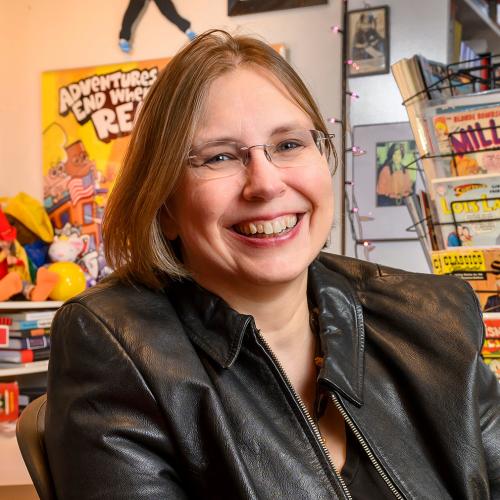Assistant Professor Elizabeth Hoiem and Associate Professor Carol Tilley will speak at the 2016 Children’s Literature Association Conference, to be held June 9-11 at The Ohio State University. The theme of the conference is “Animation,” which reflects developments in aesthetic creation and critical analysis of children’s and young adult literature.
Hoiem will chair a session titled, “The ABCs of Pedagogy: Visual Culture and Literacy,” on June 11, during which she will present her paper, “Reading objects, Reading books: The Mechanical Literacies of Industrial Britain.”
My paper argues that perceptions of early literacy and children’s books shifted during Britain’s first industrial revolution (1780-1850), as educators conceptualized learning and reading in materialist terms….Called “object learning” or “the education of things,” these pedagogical practices used a child’s physical awareness of her body and her observations of her immediate environment as the foundation for learning to read. Many children’s authors and book publishers helped to publish books and ephemera used for these reading practices, including moveable books, literacy games, model machines, mechanical toys, and other sense-engaging, or “animating” books. I consider “animation,” therefore, both as a quality of lively books and lively readers.
I suggest that reading during the early industrial revolution was closely tied to other manual literacies, which were equally associated with social mobility and class hierarchy. Object learning claimed to empower children by placing them above the elements composing their environment, which they control through what I call “mechanical literacy”—that is, by learning the dependable laws governing how things are sensed, manipulated, created, purchased, manufactured, and exchanged. I offer mechanical literacies as a way to think about a materialist turn that prefigures our digital age.
Tilley will chair the session, “Comics and Graphic Novels: Going Beyond,” on June 11, during which she will present her paper, “Beyond Reading: Comics, Kids, and Participatory Culture.”
During the mid-twentieth century, comics was the most popular form of reading for young people in the United States, despite widespread disapproval for the medium by librarians and other guardians of reading tastes. Upwards of 95% of elementary-school aged boys and girls read comic books and comic strips regularly during these years, and though the percentage declined for adolescents, it still exceeded 80%. This vast readership helped propel US sales of new comic books to nearly one billion issues annually by the early 1950s.
Reading, though, was only one part of a larger cycle of young people’s activities with the comics medium. In fact, as this paper will argue, young people used comics as a basis for developing participatory cultures. For instance, adolescents published fanzines, entered into political discourse about comics, and engaged in social activism around comics. This paper builds on archival and interview-based research to highlight some of these early examples of comics-focused participatory cultures that young people in the US created. In doing so, it heeds Fiske’s (1989) dictum that the study of a popular culture requires examination of both the cultural commodities around which that culture is based as well as the ways in which people make use of them.
Hoiem teaches in the areas of children’s literature, history of children’s literature, and fantasy literature. In her research and teaching, she explores the history of technological innovations in children’s literature—from early children’s books and toys to contemporary applications of digital pedagogy—and looks at modern technology through a historical lens. In addition to literature and the history of literature, Hoiem's research interests include community engagement—specifically, the importance of literature to contemporary youth—and digital humanities. Currently, she is developing a project in the digital humanities that uses statistical analysis to explore the separation of literature for children and adults.
Tilley teaches courses in comics reader’s advisory, media literacy, and youth services librarianship. She is a faculty affiliate in the Center for Children’s Books and Center for Writing Studies at Illinois. Part of Tilley’s scholarship focuses on the intersection of young people, comics, and libraries, particularly in the United States during the mid-twentieth century. Her research has been published in journals including the Journal of the Association for Information Science and Technology, Information & Culture: A Journal of History, and Children’s Literature in Education. Her research on Wertham has been featured by The New York Times and other media outlets. Tilley is a member of the 2016 Will Eisner Comic Industry Awards judging panel, director of external relations for the Association for Library and Information Science Education, and second vice president of the Comics Studies Society.

